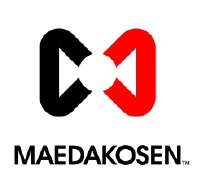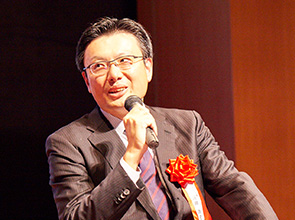Conference on Competitiveness
Interviews with the Prize Winners
Maeda Kosen Co., Ltd., the Infrastructure Business
Interviewer: Professor Ken Kusunoki, Hitotsubashi University Graduate School of International Corporate Strategy (Hitotsubashi ICS)
Interviewee: Mr. Takahiro Maeda, Senior Managing Director COO, Maeda Kosen Co., Ltd.
Interviewee: Mr. Takahiro Maeda, Senior Managing Director COO, Maeda Kosen Co., Ltd.

Main Points
- Main products: Construction materials--weather-resistant large sandbags, fiber mesh sheets for soil reinforcement, and rockfall protection nets made of three-dimensional polyethylene netting
- Emphasizes community-based sales and services, provided by "sales engineers" who are in charge of the total package of services--everything from the drafting of proposals to the provision of on-site instructions and after-sales services.
- Uses the corporate message: "Maeda Kosen is a company that synthesizes."
- Acquired seven companies and business units in order to diversify into different technological areas.
- Kusunoki:
- All those who have heard of the company Maeda Kosen please raise your hand. I see hardly any hands up. Please raise your hand if you know of BBS. [The company is known for its leading brand of light alloy wheels for cars, including racing cars, and BBS pursues the highest level of technology to achieve minimum weight and maximum safety.] Many people seem to know about BBS, which is a subsidiary of Maeda Kosen. Maeda Kosen's infrastructure business, not BBS, has won this year's Porter Prize. Would it be correct to say the infrastructure business is mostly involved in public works projects?
- Maeda:
- Yes, almost 90 percent of our sales are from public works projects. In the beginning, we used to provide materials for the construction of new roads. From the year 2000, however, there has been a rise in orders for materials used in disaster prevention and emergency restoration construction. Technology previously used primarily in public works projects is now also being used in private-sector construction projects.
- Kusunoki:
- Japan undertook a lot of construction and engineering work during the period of rapid economic growth (from the mid-1950s to the mid-1970s), but now that the economy has matured, it seems there has been a shift toward construction aimed at solving problems that arise in a broad range of circumstances. There is no doubt that your products offer very high functionality, but from the viewpoint of strategy I think your sales method is the most interesting.
There are many steps in the construction process. Usually, there is a different person in charge of each process, with a portion of the project entrusted to intermediary agents. Maeda Kosen, however, makes one person in charge of the entire process, and this person deals with all the stakeholders. Please tell us how this helps the company provide unique value to its customers.

Mr. Takahiro Maeda, Senior Managing Director COO, Maeda Kosen Co., Ltd.
|
- Maeda:
- The usual workflow for construction is as follows: design order, design work, construction order, construction, and maintenance.
The unique feature of our company is that one sales engineer is responsible for the entire process, instead of having different people in charge of the individual processes.
Infrastructure is indispensable to our lives. It is important to consider whether that infrastructure is really required or not. Our salespeople cover every prefecture, and we try to select someone who lives in that region, as much as possible. The sales engineer, who acts as a salesperson, submits a proposal to the local government about how to make life better in that region, taking into account the infrastructural problems that local residents face in their everyday lives.
There is very little movement of personnel in our company, so the same person is sometimes in charge of the same region for 20 or 30 years. These individuals develop a deep understanding about what is lacking in the region's infrastructure and how it can be corrected. I think this a point of differentiation for us.
- Kusunoki:
- I've heard that these people know all about the construction work that has been carried out in the region in the past. Moreover, they are not simply salespeople, but also engineers who can perform structural calculations.
- Maeda:
- We are aiming for a group of "sales engineers." These employees are licensed civil engineers who have acquired other professional certifications in order to gain the knowledge needed in this industry. They then use such technical knowledge to respond to customer requests for structural calculations and diagrams, for example.
- Kusunoki:
- I have the impression that, in general, public works projects begin with a call for bids or a request for tenders. Is that not true?
- Maeda:
- As I explained earlier, there is a designing phase before the construction phase. We undertake proposal-based sales during that phase, made possible by salespeople who are deeply rooted in the region.
- Kusunoki:
- So, you create value by possessing information that other companies do not have. What about after-sales services?
- Maeda:
- We have begun IoT-based activities. For example, we lay optical fiber nets equipped with sensors in the ground to observe unevenness. When the unevenness is greater than a prescribed degree we suggest repair work. I think this will be particularly useful for assessing the strength and soundness of buildings damaged in natural disasters.
- Kusunoki:
- I think such countermeasures are useful for local governments too, even from an economic point of view.
I gather that your company has established an integrated system, but why do you think it is a common practice in this industry to divide the process into different phases?
- Maeda:
- I think it is important to have a genuine affection for the region in order to carry out public works of real value. So, it is probably difficult for other companies, with their highly centralized operations, to employ individuals who live in the region and are willing to undertake the entire project from start to finish, all by themselves.
- Kusunoki:
- Maeda Kosen has been achieving great success. I think your company provides a good example of how your sustainable competitive edge comes from the fact that others cannot do what you do, nor do they have any intention of imitating you.
Your corporate message says: "Maeda Kosen is a company that synthesizes." Please tell us what you mean by "synthesize."
- Maeda:
- We have acquired 11 companies and business units since the year 2000. The acquired companies and businesses are not only from the field of civil engineering. These include companies dealing with light alloy wheels, agricultural greenhouses, and fiber processing. Moreover, the acquisitions involve buying that company's technology, such as the forging technology of the light alloy wheel manufacturer and the greenhouse company's energy-saving technology for making films. We work on a matrix with technology on the Y-axis and the business field on the X-axis.
We acquire small or medium-sized regional manufacturing companies. For example, we take a product that was being sold only in a particular region, combine it with other technologies, people and many other things, and then make it available nationwide through our sales network. This results in new employment opportunities in the region, and also helps to revitalize that region. This is what we mean by the expression "a company that synthesizes."
- Kusunoki:
- Companies that concentrate on manufacturing tend to be inward-looking. But Maeda Kosen has been utilizing the acquisition of technology and companies to grow its business. Even in manufacturing, Maeda Kosen is open and flexibly uses generic products made by other companies. I think the word "synthesize" expresses this aspect of the company.
Winners PDF
- 第17回 ポーター賞受賞企業・事業 PDF (All of the award company in this year are published. )





